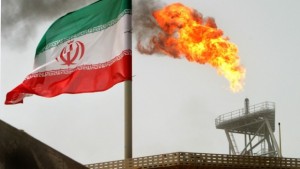 (Reuters) - Iran's�crude oil�exports have surged to their highest in 20 months, far exceeding a 1 million barrel-per-day limit set by the West under an interim deal on curbing Tehran's nuclear program.
(Reuters) - Iran's�crude oil�exports have surged to their highest in 20 months, far exceeding a 1 million barrel-per-day limit set by the West under an interim deal on curbing Tehran's nuclear program.The International Energy Agency's monthly report revised February's global crude imports from�Iran�upwards by 240,000 bpd to 1.65 million barrels per day, the highest since June 2012.
Under an interim deal signed in November between�Iran�and six world powers - known as the P5+1 - that came into effect on January 20, Iran's exports are supposed to be held to an average 1 million bpd through July 20.
Tough international sanctions over the past two years have cut Iran's oil exports by about half.
"The question is whether they are going to continue to test the sanctions," said Antoine Halff, head of the IEA's oil industry and�markets�division.
China�accounted for 168,000 bpd of the rise in imports in February,�India�for 93,000 bpd and�South Korea�for 83,000 bpd.
On the other hand, Japanese imports of Iranian oil were revised lower by 103,000 bpd, according to the IEA.
"Imports of Iranian oil are running well above 2013 levels for the third consecutive month," the report said.
The Obama administration believes that Iran's oil sales will fall in coming months and average 1 million bpd over the entire six-month period.
"We expect, we still expect, and anticipate that this will average over a six month period ... to meeting the bar that was set," in a White House fact sheet issued at the time of the November deal, State Department spokeswoman Jen Psaki told reporters.
Psaki said several factors, including Iranian contributions of oil to�Syria, sales of a light oil exempt under sanctions called condensates, and high winter demand have made Iran's oil sales look high recent months.
The Obama administration believes that Iran is unable to sell Syria oil and, rather, has been giving oil in recent months
to the country experiencing civil war. The deliveries do not benefit Iran's economy, State Department officials said.
Preliminary data for March show imports from Iran dropped to 1.05 million bpd "but that figure will likely be revised upwards closer to February levels upon receipt of more complete data," the IEA said.
It said importers of Iranian crude in March included Albania and Syria in addition to regular buyers China, India, South Korea, Japan and Turkey.
The IEA data is based on statistics provided to the organization by member and non-member states as well as shipping data.
Exports of Iranian condensate reached 140,000 bpd in February and 110,000 bpd in March, significantly lower than January's 250,000 bpd, the IEA said.
U.S. lawmakers have traditionally sought tougher measures on Iran than the White House. Earlier this week, Senators Robert Menendez, chairman of the Foreign Relations Committee, and Mark Kirk, a Republican, called on President Barack Obama to "put Iran on notice," that Washington is prepared to reinstate sanctions that would push Tehran's oil sales even lower.
A bill sponsored by Menendez to impose new sanctions on Iran stalled earlier this year, in part because of optimism about the interim deal.
An analyst said while the data reflected early days in the deal, it could show that Iran's buyers are getting more comfortable with exceeding the limits under sanctions.
"It's possible that Iran's exports will plunge below 1 million bpd this spring and summer, enabling the cap to be met," said Bob McNally, president of energy research group the Rapidan Group, who served as White House adviser to former President George W. Bush.
"But in my view, it is more likely that Iran's customers have seen the writing on the wall and concluded they can import more Iranian oil at lower risk of being sanctioned by the State Department."
By Reuters
The Iran Project is not responsible for the content of quoted articles.










